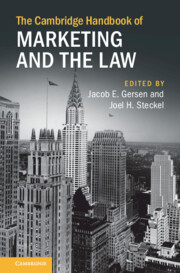Book contents
- The Cambridge Handbook of Marketing and the Law
- The Cambridge Handbook of Marketing and the Law
- Copyright page
- Dedication
- Contents
- Figures
- Tables
- Contributors
- Introduction
- Part I Understanding Consumer Behavior
- Part II Understanding Marketing Phenomena
- Part III Methodological Advances
- 9 Choice Experiments
- 10 Use of Conjoint Analysis in Litigation
- 11 Piece Problems
- 12 Marketing Analysis in Class Certification
- 13 Damages Estimation in Consumer Deception Class Actions
- 14 Taking a Second Look at Secondary Meaning
- 15 Social Media Evidence in Commercial Litigation
- Part IV How the Law Protects
11 - Piece Problems
Component Valuation in Marketing and in Patent and Tort Law
from Part III - Methodological Advances
Published online by Cambridge University Press: 29 June 2023
- The Cambridge Handbook of Marketing and the Law
- The Cambridge Handbook of Marketing and the Law
- Copyright page
- Dedication
- Contents
- Figures
- Tables
- Contributors
- Introduction
- Part I Understanding Consumer Behavior
- Part II Understanding Marketing Phenomena
- Part III Methodological Advances
- 9 Choice Experiments
- 10 Use of Conjoint Analysis in Litigation
- 11 Piece Problems
- 12 Marketing Analysis in Class Certification
- 13 Damages Estimation in Consumer Deception Class Actions
- 14 Taking a Second Look at Secondary Meaning
- 15 Social Media Evidence in Commercial Litigation
- Part IV How the Law Protects
Summary
The problems referred to in the title of this chapter concern evaluating a given variable when it is one of several that have combined to bring about a result. In some cases, there is an easy market solution. Imagine that you contract to buy a house and then the beautiful kitchen stove, one of many things that attracted you to the property, is destroyed before you close the transaction or occupy the property. How much should the price now be reduced? Here there is an upper limit based on the cost of a comparable replacement appliance. A more precise valuation would also be easy if identical houses, lacking this one feature, had recently been sold. The stove is just a piece of the larger transaction and, with these convenient facts, there is not much of a “component valuation problem.” Additionally, the stove is unlikely to have been of greater value because of its interaction with other items in the house; colors and sizes are fairly standardized. “Conjoint analysis” – a term that usually refers to survey evidence that tries to elicit the value of a component – is therefore unnecessary, or at least uncomplicated, because value does not depend on an interaction among variables in a way that is not directly observed. It is also interesting because it does not present a difficult game theory problem, or result that might be described in common parlance as something that depends on the relative bargaining skill of the parties.
- Type
- Chapter
- Information
- The Cambridge Handbook of Marketing and the Law , pp. 236 - 249Publisher: Cambridge University PressPrint publication year: 2023

